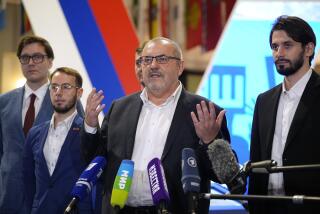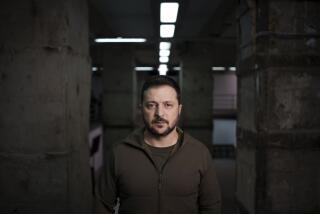Foray in Coal Region Fails to Boost Yeltsin Campaign : Russia: Siberia visit reveals president’s weakening status and flaws in his bid to win national referendum.
- Share via
NOVOKUZNETSK, Russia — Boris N. Yeltsin brought his political roadshow and his quest for votes to the Siberian capital of coal and steel Tuesday, recalling how when the chips were down, the hardy miners of the Kuzbass had rallied to his side.
But this visit was no triumph.
The Russian president’s foray into his country’s most important coal-mining region revealed both his weakening status and the flaws in his campaign to win a national referendum later this month.
“We don’t trust him--he has already promised too much,” was the indictment of Nikolai P. Artamonychev, 64, a retired builder who worried that his eight grandchildren will one day live in poverty because of Yeltsin’s politics.
During Yeltsin’s six hours in the streets and workplaces of this industrial center 1,900 miles east of Moscow, the only real moment of pro-presidential fervor came when Galina Sosninova, a retired railway worker, rushed up to him outside a maternity hospital he was visiting, exclaiming “Greetings!” and pumping his hand.
Otherwise, there was scant enthusiasm.
The sole demonstration was mounted by several dozen Yeltsin opponents who carried signs like “Traitors Leave Russia” and shouted “Judas” as Yeltsin departed from a steel and pig-iron mill for his return flight to Moscow. The protesters had to be pushed back by a double line of police, so that Yeltsin could reach his limousine unmolested.
For Yeltsin, it must have been sobering to recall that only two springs ago, tens of thousands of striking Kuzbass miners had insisted that a presidency be created in Russia so that he could fill it.
“In the most difficult of times, they supported me--the most difficult,” Yeltsin mused after emerging from his presidential jet on a sunny and surprisingly warm Siberian spring afternoon.
In May, 1991, the grimy Kuzbass became one of the scenes of Yeltsin’s political triumphs over then-Soviet President Mikhail S. Gorbachev when the Kremlin ceded control of the coal areas to the Russian government.
Yet under the wrenching economic changes presided over by Yeltsin, the fruits of that victory have turned to ashes. The Kuzbass, which produces 80% of the coking coal used in Russia, is now suffering from a production decline so severe that output has dropped to 1970 levels, local officials say.
Safety is so spotty that last year, 171 miners died in accidents, a third more than in 1991.
Asked in a recent poll whom they trust, Kuzbass residents answered only 22.1% in Yeltsin’s favor, 21% for the president’s enemies in the Congress of People’s Deputies and 46.9% for no one at all.
“People don’t believe anymore, either in the president or the state,” said Amangeldy Tuleyev, the head of the regional legislature. The conservative ran against Yeltsin in the 1991 presidential election and beat him 44% to 35% in the region.
In recent years, Russia’s coal miners have become a privileged class, earning 100,000 to 120,000 rubles per month, much to the jealousy of other workers. Tuleyev accused Yeltsin of simply trying to buy the miners off.
The centerpiece of Yeltsin’s visit Tuesday was a meeting with coal workers in an auditorium at the Abshevskaya Mine turned into a Turkish bath by television lights and the spring warmth.
Within 10 days, Yeltsin announced, the government will adopt a “serious packet” of measures to aid the stricken coal industry. He vowed to pay the mine state subsidies in the first month of each quarter to ensure that the money arrives on time.
Extending the list of crowd-pleasing measures that he has announced as the referendum nears, Yeltsin said he will agree to consider whether the mine, employing about 3,000 workers, should receive more in government subsidies. Then, seemingly on a whim, he agreed that as “an experiment” it could keep the 38% in stock it would otherwise have to yield to the government when it goes private.
Yeltsin, however, rejected a step that many leaders of the coal industry keenly seek: removal of government price controls.
“The price of coal is the price of everything--sausage, milk, social services, kindergartens,” the president said. “Allow prices to rise to what the market will bear, (and) an explosion will result.”
Despite all the goodies promised the miners, not all of the 200 or so listeners applauded Yeltsin when he left to board his Zil limousine for his next stop. And in his remarks, he hadn’t mentioned the referendum a single time.
“No ecstasy is needed now, no kind of euphoria,” Yeltsin told reporters later, discussing a campaign trip that hardly seemed to merit the name. “We need to work calmly; we don’t need political rallies.”
Every day until the April 25 vote of trust in his presidency and policies, Yeltsin said, he will try to explain his views. Today, he said, he will hold a news conference in the Kremlin and give his vision for Russia’s future.
“Two systems have collided, the old and the new,” Yeltsin told journalists. “Which will win? Much depends therefore on the referendum results.”
That was precisely the point that seemed to be missing in Novokuznetsk.
This city has about 600,000 inhabitants, but few waited on the streets to see Yeltsin’s motorcade pass. Only a few Russian flags were posted at the intersections. Much more could have been done to give Yeltsin’s vision maximum exposure in the context of the referendum.
A meeting with retirees, a large and much-dissatisfied social stratum in Russia, took place in a small second-story hall in a social security office, from which most journalists were barred. And before flying back to Moscow, Yeltsin met local elected leaders at the Kuznetsk Metallurgical Combine, although larger public meeting halls were available. Moscow-based journalists capable of telling the rest of Russia what Yeltsin said were not admitted.
More to Read
Sign up for Essential California
The most important California stories and recommendations in your inbox every morning.
You may occasionally receive promotional content from the Los Angeles Times.













